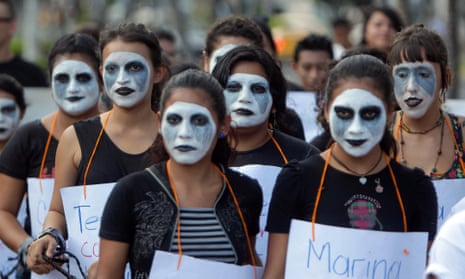A rape victim is facing 20 years in jail charged with attempted murder, after she gave birth to her abuser’s baby in a latrine in El Salvador.
In a case that highlights the rigidity of the country’s abortion laws, Imelda Cortez, 20, from an impoverished rural family in San Miguel, has been in custody since April 2017 after giving birth to a baby girl fathered by her abusive elderly stepfather.
Cortez was rushed to hospital after her mother discovered her in severe pain and bleeding heavily. The emergency room doctor suspected an abortion and called the police. Officers found the baby healthy and alive.
Cortez had been abused by her 70-year-old stepfather since she was 12 years old and said she had no idea she was pregnant. The baby survived, but Cortez was charged with attempted murder, denied bail and sent to jail after a week in hospital.
“This is the most extreme, scandalous injustice against a woman I’ve ever seen,” said Bertha María Deleón, one of Cortez’s defence lawyers. “The state has repeatedly violated Imelda’s rights as a victim; she’s deeply affected but denied psychological attention.”
Abortion is illegal in all circumstances in El Salvador and the total ban has led to aggressive persecution of women.
Like Cortez, most are poor, single rural-dwellers convicted on tenuous evidence after having a gynaecological complication such as a miscarriage or stillbirth. In many cases, the women did not realise they were pregnant.
This pattern of prosecutions targeting a particular demographic suggests a discriminatory state policy which violates multiple human rights, according to Paula Avila-Guillen, director of Latin America Initiatives at the New York based Women’s Equality Centre.
Cortez’s case is a stark illustration of how the law criminalises victims.
While Cortez was in hospital, her stepfather visited her, threatening to kill her, her siblings and her mother if she reported the abuse. Another patient overheard and told a nurse, who called the police.
At first, prosecutors accused Cortez of inventing the abuse to justify her crime, until a DNA test confirmed the baby’s paternity. Her stepfather is yet to be charged.
The criminal trial against Cortez opens today, with a ruling by the three judges expected within a week.
A psychological evaluation detected cognitive and emotional deficits consistent with abuse and trauma, yet Cortez has received no psychological support since being detained 18 months ago. She has never been allowed to hold her baby daughter.
“When you thought nothing could be crueller in El Salvador, you get Imelda’s case, which shows the fierce determination of prosecutors to go after poor women regardless of the circumstances and evidence. By shackling these women to hospital beds and sending them to prison, it sends a strong message: if you’re poor, it’s not safe to seek healthcare,” said Paula Avila-Guillen.
Abortion was criminalised in El Salvador 21 years ago, by legislators from across the political spectrum. Hopes have plummeted of the ban being relaxed to allow abortion in cases of rape or human trafficking, when the foetus is unviable, or to protect the pregnant woman’s life.
A parliamentary bill, drawn up almost two years ago amid a groundswell of public and medical support for reform, remains stuck at the committee stage, with no hope of a vote as political parties gear up for next year’s general election.
Yet campaigners refuse to give up. Five women wrongly imprisoned for murder – Teodora del Carmen Vásquez, Mayra Figueroa, Elsy Rivera, Katherine Mazariego and Maria Lopez – have been freed so far this year after dogged campaigning by domestic and international human rights groups.
A further 24 women known to activists are still serving 15 to 30 years in jail. Cortez is one of four awaiting trial or, in the case of Evelyn Hernández, a new ruling after her 2017 guilty verdict was recently overturned.
